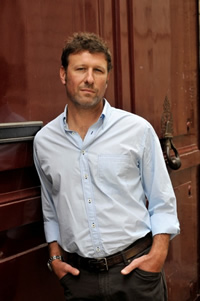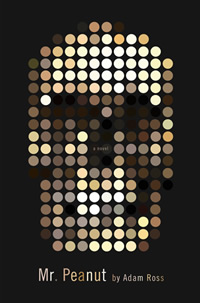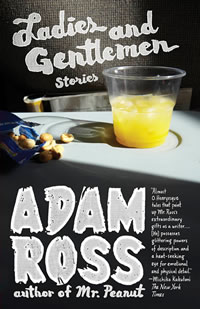“Write what you know” runs the creative-writing teacher’s command—neck and neck with “show don’t tell” as the most oft-intoned dictum trotted out at each semester’s start. But it’s also the most misunderstood maxim, misinterpreted by apprentice writers time and again as encouragement to tap that supposed wellspring of raw material: autobiographical experience.
Don’t get me wrong. I’m not suggesting that fiction writers invent every instance they dramatize. Conrad and Melville, seamen both before they became literary icons, wrote profoundly about their years at sea, just as Alice Munro did about growing up in Ontario and Twain his life on the Mississippi. But if we accept the idea that fiction writing can be taught and, conversely, that the teacher’s job is to lead the students forth from preconceived notions into new territory, then the idea that personal history is their best jumping-off point needs to be fretted. Just because something happened doesn’t mean it should happen on the page. Neither is the actual “truth” worth the writer’s attention. (When Joseph Heller’s daughter accused him of including their “verbatim conversations” in one of his novels he replied, “What makes you think you’re interesting enough to write about?”—an answer that reveals a great deal about him as a writer and a father.) Following the order to “write what you know” might get the aspiring scribe to first put pen to paper—to introduce Pete and Repeat and sit them on a fence—but it hides the way to making what happens next into something resembling art.
 Let me offer, then, the following reformulation: write what you don’t know. This isn’t to demand that the writer—let’s say he’s a scion of a British noble family—write about a Mogadishu goat herder in order to obey the rule. In fact, let’s concede the aforementioned also suffered terrible sexual abuse by his father starting at the age of five, and as a consequence became a drug addict from his teens through his late twenties, burning through a marriage or two as he struggled to right himself, and then survived to write a miraculous quintet of therapeutic novels about his alter-ego, Patrick Melrose, and his travails. Isn’t that writer—you’ve probably figured out he’s Edward St. Aubyn—only writing what he knows? Not if he writes like the following about the immediate aftereffects, both blissful and horrific, of shooting a speedball:
Let me offer, then, the following reformulation: write what you don’t know. This isn’t to demand that the writer—let’s say he’s a scion of a British noble family—write about a Mogadishu goat herder in order to obey the rule. In fact, let’s concede the aforementioned also suffered terrible sexual abuse by his father starting at the age of five, and as a consequence became a drug addict from his teens through his late twenties, burning through a marriage or two as he struggled to right himself, and then survived to write a miraculous quintet of therapeutic novels about his alter-ego, Patrick Melrose, and his travails. Isn’t that writer—you’ve probably figured out he’s Edward St. Aubyn—only writing what he knows? Not if he writes like the following about the immediate aftereffects, both blissful and horrific, of shooting a speedball:
Too overwhelmed to flush it out, [Patrick] only managed to put the cap back on the precious new syringe and drop it on the floor. He slumped against the back wall of the cubicle, his head hanging to one side, gasping and wincing like an athlete who has just crossed the finish line after losing a race, the prickle of fresh sweat breaking out all over the surface of his skin, and his eyes tightly closed while a rapid succession of scenes flashed across his inner vision: a bee crashing drunkenly into the pollen-laden pistils of a flower; fissures spreading over the concrete of a disintegrating dam; a long blade cutting strips of flesh from the body of a dead whale; a barrel of gouged-out eyes tumbling stickily between the cylinders of a wine press.
This is a perfect example of writing what you don’t know because great writing works by naming something unsaid or unrecognized which the writer only discovers in the act thereof, free to roam within the confines of his literary structure, his narrative’s frame. Put another way, this particular instance of Patrick’s using, as harrowing as it is beautiful, didn’t really unfold like this until St. Aubyn tried to capture it in language—which is to underline the fact that it never happened in reality. Welcome, reader, to the realm of pure fiction.
Writing what you don’t know is a strategy for de-familiarizing one’s subject. To obey the command is to arrive at that netherland lying somewhere between memory and pure invention. Access, however, is the writer’s struggle, for the combination to that lock changes every day, but cracking it yields riches at once stolen and earned, for here the pilfered language is energized without being florid, propulsive without seeming plotted. Entry requires a bending of autobiography until it is unrecognizable to the writer so that experience itself may be inspected freshly, like a crash-landed spaceship. “The truth is not distorted here,” said Flannery O’Connor about writing what you don’t know, “but rather a distortion is used to get at truth.” For some writers, this requires mastery of other subjects, vital themes explored by transposition to foreign lands or set amidst world-historical events. Here’s the wizardly Jim Shepard in “Pleasure Boating in Lituya Bay” from his collection, Like You’d Understand, Anyway. The story is actually about a secret a husband’s keeping from his wife, and it describes a father and son riding out a tsunami:
The [wave’s] front was unbelievably steep, and when it hit, the anchor chain snapped immediately, whipping around the pilothouse and smashing the windows. The boat arrowed seventy-five feet up into the curl like they were climbing in an elevator, their backs pressed against the pilothouse wall as if they’d been tilted back in barber’s chairs. The wave’s face was a wall of green taking them up into the sky. They were carried high over the south shore. Sixty-foot trees down below disappeared.
 “What would that be like?” the writer wonders. “I don’t know—at least not yet.” But once the research is done and the information assimilated, imagination is free to take over, eclipsing experience or, in the example above, supplanting the eye-witnessed and heartfelt, leading the mind down unexplored paths. It feels new on the page because the writer never knew it was thus until now. It also exposes the writing teacher’s dirtiest little secret: when she sits down to write, she doesn’t know what she’s doing either. She’s a highly trained amateur, never a master, but she’s a freak for repetition, for sitting down and doing it every day. “We must practice and practice,” intones Gauguin, “in order to give the illusion of spontaneity.” Writing what you don’t know requires fiendish discipline.
“What would that be like?” the writer wonders. “I don’t know—at least not yet.” But once the research is done and the information assimilated, imagination is free to take over, eclipsing experience or, in the example above, supplanting the eye-witnessed and heartfelt, leading the mind down unexplored paths. It feels new on the page because the writer never knew it was thus until now. It also exposes the writing teacher’s dirtiest little secret: when she sits down to write, she doesn’t know what she’s doing either. She’s a highly trained amateur, never a master, but she’s a freak for repetition, for sitting down and doing it every day. “We must practice and practice,” intones Gauguin, “in order to give the illusion of spontaneity.” Writing what you don’t know requires fiendish discipline.
It also obliterates the idea of author intentionality. We’ve come full circle: it’s back to the Muse, to passivity, to the author as receptacle—about the game coming to you. Hamlet was right: “The readiness is all.” When it happens, the experience is euphoric, rapturous. Wide-eyed writers utter such clichés about these bouts of inspiration all the time: “I had no idea where the story was leading me” or “The characters just took over.” But cliché’s time-release capsules still deliver some truth, and the reader’s surprise while she enjoys a story or novel—that immanent sense of being tugged along that has little to do with action or plot—isn’t craft’s trick. The reader’s titillation, sentence to sentence and paragraph to paragraph, was also the writer’s, and is thus a triangular pleasure—a ménage à trois with the text—this three-way instilling that sense of ineluctability whose effects are dread, suspense, or bliss, which the writer felt first because she, too, didn’t know how this would play out.
Here’s Claire Vaye Watkins, from Battleborn’s “Rodine Al Nido,” describing two high school girls cruising Vegas’ streets during an ill-fated night on the Strip:
The weekend crowds are dense on the sidewalks and mostly foreign or Midwestern. This allows the girls to amuse themselves at intersections by grasping hands, stepping off the curb against a red light, and glancing backward to see the crowd follow in their wake, taxicabs honking wildly. They have a teenage sense of their surroundings: They wander unknowingly into the photos of strangers, and twice Lena tramples the heel of a Japanese tourist walking in front of her. But they feel men and boys before they see them, poking each other in the ribs, perking for button-ups and baseball caps and oversize jerseys, whirling around at the sound of a skateboard.
This paragraph is a master-class in foreshadowing, for there’s not a symbol to be found, and yet death is omnipresent (“taxicabs honking wildly”), the foreboding transmitted by the sense of potential mishap (“twice Lena tramples the heel of a Japanese tourist walking in front of her”) and communicates deep unease, this pair of unprotected cubs roaming the American Serengeti as clueless (“they wander unknowingly into the photos of strangers”) as they are easily ambushed (“whirling around at the sound of a skateboard”). The details are perfect, but whether or not Watkins suffered a similarly harrowing night—things don’t turn out well for our girls, I’m afraid—matters not a whit because she made this stuff up as she was going along. Don’t be fooled: this street doesn’t exist; it’s a place to which Watkins has never traveled except imaginatively, even if the About the Author paragraph tells us she’s from Nevada and has probably been to Vegas a million times. And that’s not a skateboard either. Or, to quote Magritte: “Ceci n’est pas une pipe. ”
 Writing what you don’t know is thereby an act of making a world. Done vividly enough, it can have the side effect of re-making our own, so that for a week, two, or maybe forever, we see the world through the novel. It’s as if we took Morpheus’s red pill and, having gone down the rabbit-hole, are now permanently aware of The Matrix. We suffer a kind of double-vision, and our admiration for writers who accomplish this feat knows no bounds. Here’s Ben Fountain from his ecstatic Iraq war novel, Billy Lynn’s Long Halftime Walk. His aforementioned protagonist, a war hero on a multi-week junket with his squad to boost the country’s flagging morale, is enjoying the Dallas Cowboys’ warm-ups during a very cold day at Texas Stadium:
Writing what you don’t know is thereby an act of making a world. Done vividly enough, it can have the side effect of re-making our own, so that for a week, two, or maybe forever, we see the world through the novel. It’s as if we took Morpheus’s red pill and, having gone down the rabbit-hole, are now permanently aware of The Matrix. We suffer a kind of double-vision, and our admiration for writers who accomplish this feat knows no bounds. Here’s Ben Fountain from his ecstatic Iraq war novel, Billy Lynn’s Long Halftime Walk. His aforementioned protagonist, a war hero on a multi-week junket with his squad to boost the country’s flagging morale, is enjoying the Dallas Cowboys’ warm-ups during a very cold day at Texas Stadium:
Foom, the soggy thump of each kick resounds in Billy’s gut as the ball rockets off on a steep trajectory, up, up, onward and upward still, your eye falters at the spot where the ball should level off and yet it climbs higher still as if some unseen booster charge has fired and straight for the bottomless dome it goes. Billy tries to mark the absolute highest point, that instant of neutral buoyancy where the ball hangs or dangles, actually pauses for a moment as if measuring the fall that even now begins as the nose rolls over with a languid elegance, and there’s an aspect of surrender, of grateful relinquishment as it yields to the gravitational fate.
Yes, it’s exactly like that when a pro punter kicks. And it isn’t, of course. Here, on the page, it’s realer. Better, stronger, faster. Consciousness rebuilt. Art is life’s Six Million Dollar Man. Still, one of the beauties in Fountain’s paragraph is its microcosmic harmony within the novel’s macrocosmic whole, for it’s another instance of deep foreshadowing, of the language’s surface functioning as motif, as fate, because that ball, so kicked, stands in for Billy himself, is his character’s objective correlative: our hero is thinking about going AWOL on this day of days, hanging or dangling between Iraq and the homeland.
I’ll bet Fountain didn’t realize this irony as he was writing, though I’m sure he caught it later and, during editing, brilliantly teased it out. These after-the-fact discoveries are part of the process, after all, the writer’s do-overs, the Muse’s mulligans, the thing he should’ve said to that person at the party but instead dreamed of while he lay in bed. Or maybe watching Dallas play one Thanksgiving afternoon, Fountain saw something that tickled his fancy—a booming punt—and, being keen to his better instincts, jotted it down.
“I copied it into my notes,” writes Philip Roth, “into that ever-enlarging storage plant for my narrative factory, where there is no clear demarcation dividing actual happenings eventually consigned to the imagination from imaginings that are treated as having actually occurred—memory as entwined with fantasy as it is in the brain.” Writing what you don’t know means conceding you don’t know everything about what you’re writing. It’s an argument for the existence of the unconscious, and its higher power is to be trusted. Tapping into it—that rigorous waiting—is the hard part.
Copyright (c) 2013 by Adam Ross, author of Mr. Peanut and Ladies and Gentlemen. All rights reserved. Ross will give a free public reading on February 21 at 7 p.m. in Buttrick Hall, Room 101, on the Vanderbilt University campus in Nashville.
Tagged: Fiction





